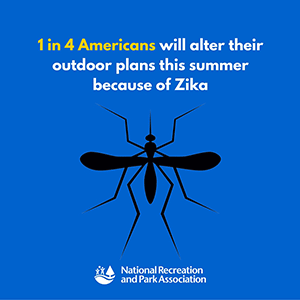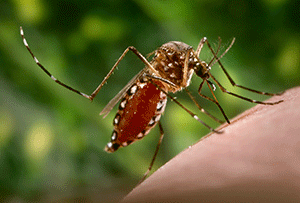 The Zika virus has been in the headlines over the past few months and it appears that one in four Americans are or will be changing their outdoor plans this summer as a result. This is the key finding from a poll conducted on behalf of the National Recreation and Park Association (NRPA) in mid-May.
The Zika virus has been in the headlines over the past few months and it appears that one in four Americans are or will be changing their outdoor plans this summer as a result. This is the key finding from a poll conducted on behalf of the National Recreation and Park Association (NRPA) in mid-May. Twenty-six percent of Americans say they are likely to alter their summer outdoor plans because of concerns with the Zika virus. Specifically, six percent of surveyed Americans said that they “definitely will” change their summer plans, seven percent say that they “very likely” will alter plans and 12 percent indicate they are “somewhat likely” to adjust plans this summer. At the same time, two-thirds of Americans do not anticipate a significant change in their summer outdoor activities as a result of the Zika virus while another ten percent told our pollsters that they are not familiar with the virus and its potential health effects.
Digging through the survey responses from the 1,000 adult Americans finds some interesting patterns. Not surprisingly, Millennials are most likely to indicate an intention to change their plans this summer given the findings that pregnant women infected with Zika can lead to birth defects. Forty percent of adults aged between 18 and 34 and 33 percent of adults aged between 34 and 44 indicate they are altering their summer outdoor plans because of concerns surrounding the Zika virus. This is significantly higher than the 16 percent of Baby Boomers who tell us that they are shifting their plans.
A similar pattern emerges with households that have children. Thirty-six percent of households with children are changing their summer plans because of the Zika virus versus 21 percent of childless households. Further, households with older children (that is, with at least one child between the ages of 13 and 17) are even more likely to reconsider their outdoor recreation plans this summer because of the virus.
 At the same time, concerns about the virus hold relatively steady regardless of where the survey respondent lives, with approximately the same percentages of Americans in all four Census regions indicating plans to alter summer outdoor plans as a result of the Zika virus. Further, similar percentages of American adults expressed concerns with the Zika virus regardless of sex and their race and ethnic background.
At the same time, concerns about the virus hold relatively steady regardless of where the survey respondent lives, with approximately the same percentages of Americans in all four Census regions indicating plans to alter summer outdoor plans as a result of the Zika virus. Further, similar percentages of American adults expressed concerns with the Zika virus regardless of sex and their race and ethnic background. One final slice of the data that caught our attention and represents an opportunity for both park and recreation agencies and professionals alike deals with level of education. Seventy percent of Americans with a college degree indicate they do not plan to alter their summer plans as a result of the Zika virus versus 57 percent of those with high school degree or less. But more interesting is that college educated Americans are significantly more likely to be familiar with Zika and its possible implications on their health than are other adults.
This is where park and recreation agencies can take a leadership role. Not only can park and recreation agencies take measures to control mosquito breeding grounds, they can disseminate accurate, timely information to the public to educate them on the risks from the Zika virus and the steps they can take to mitigate that risk. I think we all agree that an informed public is a protected public. NRPA will be sharing information with its members as it becomes available through our communication channels and on our dedicated webpage to Zika and Parks. After all, we all want everyone to be confident that they can enjoy the outdoors at their local parks this summer.
Kevin Roth is NRPA's Vice President of Research.

